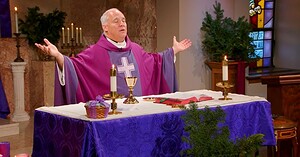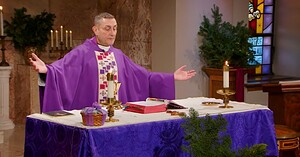The Nativity Of The Lord
Homily Video
The Nativity Of The Lord Homily Transcript
>>Well, a blessed Christmas to all of you who are joining us for this Christmas morning mass from Mercy Home. It’s an opportunity for us to give thanks to God for many blessings, as I said at the beginning of the mass, but also for the blessing that Mercy Home is to so many people.
At the beginning of the school year, one of the pastors told me that he decided to visit the kindergarten class to welcome them – new students to the school. And he said to them, “Have you ever noticed, children, that when God made us, he gave us one mouth? He gave us one nose. But he gave us two ears. Why do you think that is?” And immediately a little kindergarten boy raised his hand, he said, “So that we listened to both sides.”
[laughter]
What a wise child. From the mouths of babes come some wisdom. And maybe we would like to have that saying etched on the halls of Congress or the ways that we talk to people who are in the media time – that we listen to both sides. I thought of that story as I reflected on this wonderful set of readings that we have for Christmas morning. Because, while it’s true that the shepherds are given a wonderful sight of this child, they are also told to listen.
And we hear that the gospel ends, that they rejoice about all that they heard, all that was told to them. And so in many ways, the shepherds are, for us, an example of how maybe we should listen to both sides to open our ears to what God is telling us in perhaps a way that would make us have a kind of conversion in our life that allows us to live our faith more fully. Notice, first of all, that they are told that a savior is born – Christ the Lord, and they may think in their minds that they’re talking about some great king who is going to be clothed in great robes and heralded in a very public way as a birth of a of a savior is born.
But instead, they are given they are told that this child is going to be dressed in rags. And whose going to be put lying in a feed box, a manger. That had to, in some way, give them a new calibration of what really is important and valuable. I think it’s so very important for us as we hear that text not to glide over it and to romanticize it in our creches that we have, but to take into account that what we are told at the birth of the Savior is that the Lord is coming in the midst of people who are marginalized, who are poor. In many ways, that we would look upon those who are in need as forth, not as objects of our charity or recipients of our charity, but rather, as the Pope has told us time and again, they are active agents.
They have something to offer us that we would otherwise be missing. I think of the great work that’s done here at Mercy Home, and I think that Father Scott and all his collaborators would be the first to tell you that they receive so much more than they give to the young people that they serve. They learn so much more about life for them. They give them a sense of – that the work that they’re doing is really something that’s important because these are active agents who are taking responsibility for their own lives.
And so today, as we hear this sign of the child who is coming to us as a savior, born with rags and lying in a feed box, it’s an opportunity for us to see that God is calling us to look at life a lot differently, especially for people who are poor, not to see them just as objects of our charity that we’re helping, but really as members of society who contribute to our lives, who make a difference, that our lives in some way would be impoverished without their contribution, without their offering something to us as a means of helping us understand what it means to be more human.
The second thing is they go in haste, we’re told. They leave the safety of their fields. They’re keeping watch over their sheep in a familiar place. And they are to go into the village, the town of Bethlehem. The people in towns did not like shepherds. They considered them lowlife and sometimes thieves who would take advantage of them. And so, they were people who were not welcomed.
They were people who in many ways were cast aside as, uh, not being welcomed.
And so they had to take a risk to go into places that were not so safe for them. Not so familiar. I always liked that story of the first days after Pope Francis was elected pope. He told his staff that he wanted his first visit to go to Lampedusa, that small island, which is only about eight square miles and has about 6000 people on it because they were having a lot of boat people coming from northern Africa. Just overwhelming that population. They were trying to escape and many people were drowned in the Mediterranean.
He wanted to go there to be with them. And he was told by is his staff: Well, you know, that’s pretty risky to go on your first trip to a place like that. We really don’t know what security’s like. And so, it’ll take some months to do it. And he said, “Well, I want it done as soon as possible.” But after a few weeks, he didn’t hear back from them at all. And then one day, the offices of the Secretary of State got a phone call from Alitalia Airlines saying that they had a reservation there from a Jorge Bergoglio – which was the pope’s name – going from Rome to Lampedusa. He had made a reservation on a commercial airline.
[laughter]
He was not going to be put, you know, in some way ignored on this. And so, they hurried up and they made arrangements so that his first trip could be within just a few months after his election. I think he went in May after his March election. But he wanted to let people know that it’s we have to take risks to go out, to visit with people. To go out of our familiar place that we are comfortable with. And I think that’s important for us to do as well in our lives.
Maybe there are some relationships that we have that we just don’t want to get involved in in our families, that we just haven’t talked to somebody for a long time. We don’t want to maybe open that chapter that was so painful for them or for us. But Christmas is an opportunity for us to leave the safety of the fields where we are familiar with and to go into those spaces that might be a little risky for us. To go into those places, that maybe there is hurt. Much like many of the benefactors here who come to volunteer, come into a place that’s not familiar to them, engage these young people sometimes with a little bit of risk in their mind of thinking that things are somewhat unfamiliar.
But that is what the shepherds offer us today as well. And finally, we see that the shepherds return home different. They go home rejoicing, glorifying God of everything that they have heard. Christmas has to be an opportunity that not we just celebrate because it’s on the calendar, but it has to be an opportunity, a real conversion in our lives that something different is happening in us. That we rejoice more in life, that we have, we have a greater sense of joy not because of the presents we get or the songs that we sing or the food that we eat, but something different has happened in us and we should look for that kind of change. Being able to go back to our ordinary life after this season, rejoicing in the gifts that God has given us.
So, these shepherds are people who teach us this day, this Christmas Day, to use both of our ears to listen to both sides as that little kindergarten kid said. So that our lives are truly are those that allow us to see that God is doing something new that prompts us to go out of the safety of the few familiar places that we live in, to go into places that may be a little risky, but also to recapture a sense of joy about our lives in a world that’s filled with sadness, to know that God indeed is calling us to be more in this coming year, to realize that there is yet another step in the journey, the pilgrimage that we have, the faith lives that God has given us to do something new to make this new year of 2023 something very special.
Knowing that God is calling us to take the next step in life. And it all begins by remembering that God has given us two ears.
Readings
First Reading:
Is 62:11-12
Second Reading:
Ti 3:4-7
Gospel:
Lk 2:15-20 (15)
Featured Text
Discover More
Third Sunday of Advent
December 14, 2025
Second Sunday of Advent
December 7, 2025
First Sunday of Advent
November 30, 2025
Request Sunday Mass Guide
The Sunday Mass Guide sent to your home address
Spiritual nourishment and updates from the Sunday Mass community
Monthly reflections from Fr. Scott Donahue, our Principal Celebrant


